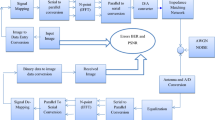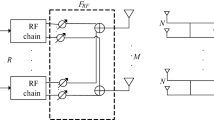Abstract
Among numerous wireless communication networks, MIMO-OFDM plays a vital role in the enhanced data transmission rate. Numerous researches are performed based on estimating the channel to attain optimal output. However, because of the enhanced bit error rate, attaining an optimal estimated channel is a challenging task. So to decrease the bit error rate and to enhance the system performances, this article aims in proposing the mutable weight-based adaptive particle swarm optimization (MAPSO) based MIMO-OFDM approach for the optimal channel estimation. This approach consists of four phases: OFDM with MIMO, STBC based OFDM coding, signal recognition, and MC-CDMA for the evaluation of optimal channel estimation. The MAPSO algorithm is used in the MC-CDMA approach for tuning the parameters at every level of channel estimation to achieve optimal value. The metrics such as SER, BER, MSE, and NMSE are computed for the proposed approach to achieve better performance. The comparative analysis is carried out with several other existing approaches and the experimental results reveal that the proposed MAPSO based MIMO-OFDM approach outperformed other approaches.











Similar content being viewed by others
Data Availability
Data sharing is not applicable to this article as no new data were created or analyzed in this study.
References
Kang, X. F., Liu, Z. H., & Yao, M. (2022). Deep learning for joint pilot design and channel estimation in MIMO-OFDM systems. Sensors, 22(11), 4188.
Mashhadi, M. B., Yang, Q., Gündüz, D. (2020). CNN-based analog CSI feedback in FDD MIMO-OFDM systems. In ICASSP 2020–2020 IEEE International Conference on Acoustics, Speech and Signal Processing (ICASSP), pp. 8579–8583. IEEE.
Rakshit, M., Bhattacharjee, S., Garai, G., & Chakrabarti, A. (2020). A novel distributive population-based differential evolution algorithm for SLM scheme to reduce PAPR in massive MIMO-OFDM systems. SN Computer Science., 1(5), 1–7.
Zhang, Y., Zhu, X., Liu, Y., Jiang, Y., Guan, Y. L., & Lau, V. K. (2022). Hierarchical BEM based channel estimation with very low pilot overhead for high mobility MIMO-OFDM systems. IEEE Transactions on Vehicular Technology, 1, 15.
Ahmed, A. S., Hamdi, M. M., Abood, M. S., Khaleel, A. M., Fathy, M., & Khaleefah, S. H. (2022). Channel Estimation using LS and MMSE Channel Estimation Techniques for MIMO-OFDM Systems. In 2022 International Congress on Human-Computer Interaction, Optimization and Robotic Applications (HORA), pp. 1–6. IEEE.
Wu, Q., Zhou, X., Wang, C., & Cao, H. (2022). Variable pilot assisted channel estimation in MIMO-OFDM system with STBC and different modulation modes. EURASIP Journal on Wireless Communications and Networking, 2022(1), 1–13.
Ilaiyaraja, S., Balasubadra, K., & Senthil, B. (2020). An efficient carrier frequency offset tracking for OFDMA systems using normalized least-mean-square algorithm. Circuits, Systems, and Signal Processing., 39, 1–3.
Ghaedi, N., Shirazi, M. A., & Sadeghzadeh, R. A. (2018). Spatial interference cancellation in MIMO systems using side lobe canceller structure Iranian. Journal of Science and Technology, Transactions of Electrical Engineering., 42(1), 75–82.
Sun, L., Li, Y., Zhao, Y., Huang, L., & Gao, Z. (2015). Optimized adaptive algorithm of digital self-interference cancellation based on improved variable step. In 2015 IEEE 9th International Conference on Anti-counterfeiting, Security, and Identification (ASID), pp. 176–179. IEEE.
Nair, A. K., & Menon, V. (2022). Joint Channel Estimation and Symbol Detection in MIMO-OFDM Systems: A Deep Learning Approach using Bi-LSTM. In 2022 14th International Conference on Communication Systems & Networks (COMSNETS), pp. 406–411. IEEE.
Sundararaj, V., Muthukumar, S. and Kumar, R.S., 2018. An optimal cluster formation based energy efficient dynamic scheduling hybrid MAC protocol for heavy traffic load in wireless sensor networks. Computers & Security, 77, pp.277-288.
Sundararaj, V. and Selvi, M., 2021. Opposition grasshopper optimizer based multimedia data distribution using user evaluation strategy. Multimedia Tools and Applications, 80(19), pp.29875-29891.
Kavitha, D. and Ravikumar, S., 2021. IOT and context‐aware learning‐based optimal neural network model for real‐time health monitoring. Transactions on Emerging Telecommunications Technologies, 32(1), p.e4132.
MM, G.A. and TF, M.R., 2022. An efficient SVM based DEHO classifier to detect DDoS attack in cloud computing environment. Computer Networks, 215, p.109138.
Jeyalakshmi, S., Sekar, S., Ravikumar, S. and Kavitha, D., 2022. Random Forest-Based Oppositional Henry Gas Solubility Optimization Model for Service Attack Improvement in WSN. Journal of The Institution of Engineers (India): Series B, pp.1-12.
Srinivasa Gowda, A. and Annamalai, N.M., 2021. Hybrid salp swarm–firefly algorithm‐based routing protocol in wireless multimedia sensor networks. International Journal of Communication Systems, 34(3), p.e4633.
Ni, C., Ma, Y., & Jiang, T. (2016). A novel adaptive tone reservation scheme for PAPR reduction in large-scale multi-user MIMO-OFDM systems. IEEE Wireless Communications Letters., 5(5), 480–483.
Kumutha, D., & Prabha, N. A. (2017). Hybrid STBC-PTS with enhanced artificial bee colony algorithm for PAPR reduction in MIMO-OFDM system. Journal of Ambient Intelligence and Humanized Computing., 25, 1–7.
Abdullah, E., Idris, A., & Saparon, A. (2017). Papr reduction using scs-slm technique in stfbc mimo-ofdm. ARPN Journal of Enggineering and Application Science, 12(10), 3218–3221.
Ramadan, K., Dessouky, M. I., & Abd El-Samie, F. E. (2020). Performance enhancement of OFDM systems with lower-complexity using DST based on successive interference cancellation. Digital Signal Processing., 102, 102739.
Fan, S., Xiao, Y., Fang, S., Zhao, Y., & Zhou, X. (2020). Clipping noise cancellation for signal detection of GSTFIM systems. IEEE Access., 8, 33830–33837.
Lin, Y. C., Lee, T. S., & Lin, C. H. (2020). Interference avoidance and cancellation in automotive OFDM radar networks. Journal of Signal Processing Systems., 92(12), 1383–1396.
Adnan, S., Fu, Y., Ahmed, B. J., Tahir, M. F., & Banoori, F. (2020). Modified ordered successive interference cancellation MIMO detection using low complexity constellation search. AEU-International Journal of Electronics and Communications., 68, 153223.
VenkateswaraRao, N., & Venkateswarlu, C. (2017). Hybrid ABC optimization based interference cancellation in MIMO-OFDM. In 2017 2nd International Conference on Communication and Electronics Systems (ICCES), pp. 21–25. IEEE.
Li, B., Yang, L. L., Maunder, R. G., & Sun, S. (2020). Self-interference cancellation and channel estimation in multicarrier-division duplex systems with hybrid beamforming. IEEE Access., 8, 160653–160669.
Guo, X., Zhang, J., Chen, S., Mu, X., & Hanzo, L. (2017). Two-stage time-domain pilot contamination elimination in large-scale multiple-antenna aided and TDD based OFDM systems. IEEE Access, 5, 8629–8641.
Zhang, X., Liu, H., & Tu, L. (2020). A modified particle swarm optimization for multimodal multi-objective optimization. Engineering Applications of Artificial Intelligence., 95, 103905.
Horn, J., Nafpliotis, N., & Goldberg, D. E. (1994). A niched Pareto genetic algorithm for multiobjective optimization, Proceedings of the First IEEE Conference on Evolutionary Computation. IEEE World Congress on Computational Intelligence, Orlando, FL, 1, 82–87. doi: https://doi.org/10.1109/ICEC.1994.350037.
Gong, Y. J., Li, J. J., Zhou, Y., Li, Y., Chung, H. S., Shi, Y. H., & Zhang, J. (2015). Genetic learning particle swarm optimization. IEEE Transactions on Cybernetics., 46(10), 2277–2290.
Nandi, S., Pathak, N. N., Nandi, A. (2020). A Novel Adaptive Optimized Fast Blind Channel Estimation for Cyclic Prefix Assisted Space–Time Block Coded MIMO-OFDM Systems. Wireless Personal Communications. pp.1–7.
Shlezinger, N., Fu, R., Eldar, Y. C. (2020). DeepSIC: Deep soft interference cancellation for multiuser MIMO detection. arXiv preprint arXiv:2002.03214.
Venkateswarlu, C., VenkateswaraRao, N. (2019). Optimization for Interference Cancellation in MIMO-OFDM System using Modified Bat Algorithm (MBA), IJRTE.
Sharief, A. H., & Sairam, M. S. (2019). Performance analysis of MIMO-RDWT-OFDM system with optimal genetic algorithm. AEU-International Journal of Electronics and Communications., 111, 152912.
Funding
Not applicable.
Author information
Authors and Affiliations
Contributions
CV agreed on the content of the study. CV and NVR collected all the data for analysis. CV agreed on the methodology. CV and NVR completed the analysis based on agreed steps. Results and conclusions are discussed and written together. Both author read and approved the final manuscript.
Corresponding author
Ethics declarations
Conflict of interest
The authors declare that they have no conflict of interest.
Human and Animal Rights
This article does not contain any studies with human or animal subjects performed by any of the authors.
Informed Consent
Informed consent was obtained from all individual participants included in the study.
Additional information
Publisher's Note
Springer Nature remains neutral with regard to jurisdictional claims in published maps and institutional affiliations.
Rights and permissions
Springer Nature or its licensor holds exclusive rights to this article under a publishing agreement with the author(s) or other rightsholder(s); author self-archiving of the accepted manuscript version of this article is solely governed by the terms of such publishing agreement and applicable law.
About this article
Cite this article
Venkateswarlu, C., Rao, N.V. An Efficient MAPSO Model for Interference Cancellation and Optimal Channel Estimation in MIMO-OFDM System. Wireless Pers Commun 128, 283–307 (2023). https://doi.org/10.1007/s11277-022-09955-w
Accepted:
Published:
Issue Date:
DOI: https://doi.org/10.1007/s11277-022-09955-w




